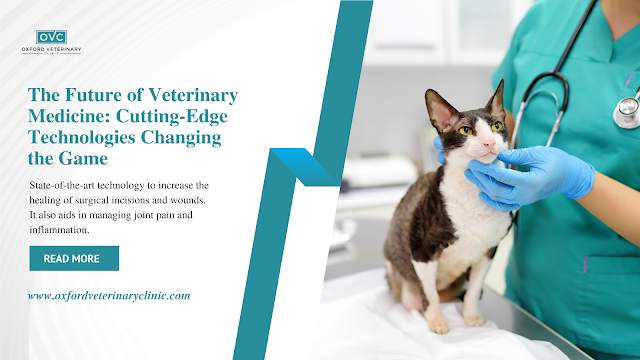The Future of Veterinary Medicine: Cutting-Edge Technologies Changing the Game
It is imperative that veterinary medicine continues to evolve, and new technologies are playing a big role in shaping its future.
From telemedicine to robotic surgery, these advancements are helping veterinarians diagnose and treat illnesses more accurately and effectively, while also improving the well-being of animals.
If you’re looking for the best Oxford MS Veterinary Clinic, there are many qualified and experienced veterinarians in the area who are using these cutting-edge technologies to provide the best possible care for their patients.
In this article, we’ll explore some of the most exciting technologies that are changing the game in veterinary medicine and how they’re impacting the industry as a whole.
Advancements in Diagn and Treatment
One of the most exciting areas of advancement in veterinary medicine is in the realm of diagnostic tools. Telemedicine, for example, is allowing veterinarians to consult with colleagues and specialists remotely, making it easier to get a second opinion or receive specialized care for complex cases.
Additionally, advances in ultrasound technology are providing veterinarians with clearer and more detailed images of internal organs, making it easier to identify and diagnose problems.
Another area where technology is making a big impact is in the treatment of illnesses. 3D printing, for example, is allowing veterinarians to create custom prosthetic limbs for animals that have lost a limb due to injury or illness.
And with the help of robotics, veterinarians are now able to perform surgeries with greater precision and accuracy than ever before.
Improving Animal Welfare
New technologies are not only making it easier for veterinarians to diagnose and treat illnesses, but they’re also making a big impact in improving animal welfare.
For example, stem cell therapy could revolutionize healthcare by treating chronic conditions such as osteoarthritis and spinal cord injuries in animals.
Robotic surgery is another technology that is helping to improve animal welfare. With the help of robotics, veterinarians are now able to perform surgeries with greater precision and accuracy, which means less pain and discomfort for animals, faster recovery times, and better outcomes.
The Role of Data and Artificial Intelligence
Data and artificial intelligence (AI) are also playing a big role in the future of veterinary medicine. Machine learning algorithms, for example, are being used to analyze patient data and develop new treatment protocols.
This is helping veterinarians to make more informed decisions about how to care for their patients and improve their outcomes. Big data analysis is also making a big impact in the field of veterinary medicine.
By analyzing large amounts of data from many different sources, veterinarians are able to gain new insights into the health and well-being of animals, which is helping them to develop new treatments and therapies.
Addressing Challenges in Veterinary Care
Despite the much advancement that is being made in veterinary medicine, there are still many challenges facing the industry.
One of the biggest challenges is the shortage of veterinarians in rural areas, which makes it difficult for many animals to receive the care they need. New technologies are helping to address this challenge by making it easier for veterinarians to provide care remotely.
Telemedicine, for example, is allowing veterinarians to consult with colleagues and specialists remotely, which means that animals in rural areas can receive the same level of care as those in more urban areas.
There is also a lack of funding for research and development facing the veterinary profession.
But with the help of new technologies, veterinarians are now able to conduct research more efficiently and effectively, which is helping to drive progress in animal health research.
The Impact of Technology on Pet-Owner Relationship
New technologies are also improving the communication and accessibility between pet owners and veterinarians.
With the advent of telemedicine, pet owners can now consult with their veterinarian remotely, which is especially beneficial for those who live in remote areas or have mobility issues.
Online appointment scheduling and mobile apps are also making it easier for pet owners to manage their pet’s health care and keep track of appointments.
The Benefits of Technology in Preventive Care
Preventive care is another area where technology is making a big impact in veterinary medicine. Wearable monitoring devices for pets, for example, are helping veterinarians to detect and prevent health problems before they become serious.
These devices can track a pet’s activity levels, heart rate, and other vital signs, and alert the owner and veterinarian to any potential issues.
Remote monitoring tools are also being developed, which allow veterinarians to keep an eye on their patients even when they’re not in the clinic.
Conclusion
New technologies are making a big impact in the field of veterinary medicine, from diagnostic tools to treatments and therapies.
They are helping veterinarians to diagnose and treat illnesses more accurately and effectively, while also improving the well-being of animals.
With a thorough understanding of the latest developments in veterinary medicine and working with a vet in Oxford MS who is up-to-date on the latest technologies, you can ensure that your pet receives the best possible care.
A Veterinarian Oxford MS who is trained in the latest technologies can help you make the most of the advancements in veterinary medicine and take the best care of your furry friend.



Comments
Post a Comment